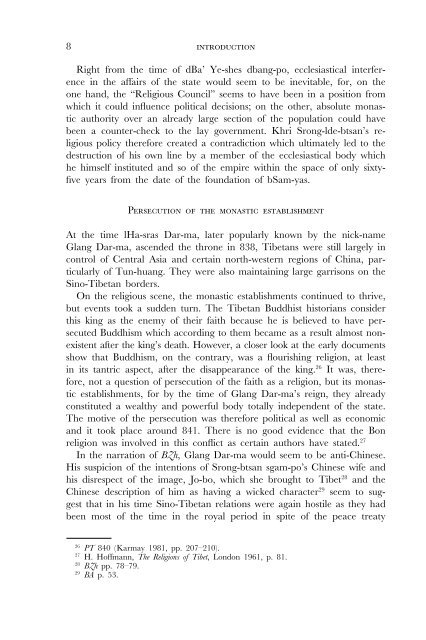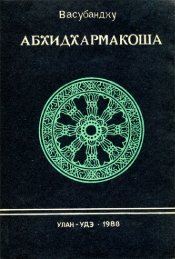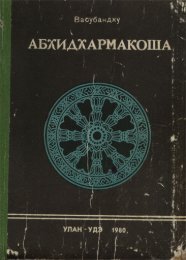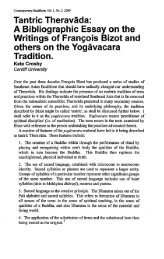- Page 2 and 3: The Great Perfection (rDzogs chen)
- Page 4 and 5: The Great Perfection (rDzogs chen)
- Page 6 and 7: To my son ’Od-zer Rab-dbang
- Page 8 and 9: PREFACE The Great Perfection, in Ti
- Page 10 and 11: ACKNOWLEDGEMENTS I would like to re
- Page 12 and 13: xiv abbreviations RT Rin chen gter
- Page 14 and 15: 2 introduction The cause of the Tib
- Page 16 and 17: 4 introduction Mùlasarvàstivàda
- Page 18 and 19: 6 introduction During the reign of
- Page 22 and 23: 10 introduction As the civil war ra
- Page 24 and 25: 12 introduction As there was no aut
- Page 26 and 27: 14 introduction rab-’byams (1308-
- Page 28 and 29: CHAPTER ONE THE LEGEND OF VAIROCANA
- Page 30 and 31: the legend of vairocana 19 Chapter
- Page 32 and 33: the legend of vairocana 21 includes
- Page 34 and 35: the legend of vairocana 23 to the T
- Page 36 and 37: the legend of vairocana 25 My spiri
- Page 38 and 39: the legend of vairocana 27 So in Ti
- Page 40 and 41: the legend of vairocana 29 dàki»
- Page 42 and 43: the legend of vairocana 31 and his
- Page 44 and 45: the legend of vairocana 33 his work
- Page 46 and 47: the legend of vairocana 35 the end
- Page 48 and 49: the legend of vairocana 37 it is th
- Page 50 and 51: CHAPTER TWO THE ANCIENT DOCUMENTS O
- Page 52 and 53: the ancient documents on rdzogs che
- Page 54 and 55: the ancient documents on rdzogs che
- Page 56 and 57: the ancient documents on rdzogs che
- Page 58 and 59: the ancient documents on rdzogs che
- Page 60 and 61: the ancient documents on rdzogs che
- Page 62 and 63: the ancient documents on rdzogs che
- Page 64 and 65: the ancient documents on rdzogs che
- Page 66 and 67: the ancient documents on rdzogs che
- Page 68 and 69: the ancient documents on rdzogs che
- Page 70 and 71:
the ancient documents on rdzogs che
- Page 72 and 73:
the ancient documents on rdzogs che
- Page 74 and 75:
the ancient documents on rdzogs che
- Page 76 and 77:
the ancient documents on rdzogs che
- Page 78 and 79:
the ancient documents on rdzogs che
- Page 80 and 81:
the ancient documents on rdzogs che
- Page 82 and 83:
the ancient documents on rdzogs che
- Page 84 and 85:
the ancient documents on rdzogs che
- Page 86 and 87:
the ancient documents on rdzogs che
- Page 88 and 89:
the ancient documents on rdzogs che
- Page 90 and 91:
the ancient documents on rdzogs che
- Page 92 and 93:
the ancient documents on rdzogs che
- Page 94 and 95:
the ancient documents on rdzogs che
- Page 96 and 97:
the cig car ba tradition in tibet 8
- Page 98 and 99:
the cig car ba tradition in tibet 8
- Page 100 and 101:
the cig car ba tradition in tibet 9
- Page 102 and 103:
the cig car ba tradition in tibet 9
- Page 104 and 105:
the cig car ba tradition in tibet 9
- Page 106 and 107:
the cig car ba tradition in tibet 9
- Page 108 and 109:
the cig car ba tradition in tibet 9
- Page 110 and 111:
the cig car ba tradition in tibet 1
- Page 112 and 113:
the cig car ba tradition in tibet 1
- Page 114 and 115:
the cig car ba tradition in tibet 1
- Page 116 and 117:
CHAPTER FOUR THE DEVELOPMENT OF THE
- Page 118 and 119:
the development of the rdzogs chen
- Page 120 and 121:
the development of the rdzogs chen
- Page 122 and 123:
Reply: the development of the rdzog
- Page 124 and 125:
the development of the rdzogs chen
- Page 126 and 127:
the development of the rdzogs chen
- Page 128 and 129:
the development of the rdzogs chen
- Page 130 and 131:
CHAPTER FIVE RDZOGS CHEN THOUGHT AN
- Page 132 and 133:
dzogs chen thought and its critics
- Page 134 and 135:
dzogs chen thought and its critics
- Page 136 and 137:
dzogs chen thought and its critics
- Page 138 and 139:
dzogs chen thought and its critics
- Page 140 and 141:
dzogs chen thought and its critics
- Page 142 and 143:
dzogs chen thought and its critics
- Page 144 and 145:
CHAPTER SIX THE PROVENANCE OF THE F
- Page 146 and 147:
the role of MTPh 139 The gSang ba s
- Page 148 and 149:
the role of MTPh 141 “During the
- Page 150 and 151:
the role of MTPh 143 saápannakrama
- Page 152 and 153:
the role of MTPh 145 Many different
- Page 154 and 155:
the role of MTPh 147 constitutes an
- Page 156 and 157:
the role of MTPh 149 The other pecu
- Page 158 and 159:
the role of MTPh 151 The revision w
- Page 160 and 161:
the role of MTPh 153 (I) The Phyal
- Page 162 and 163:
the role of MTPh 155 II. The view o
- Page 164 and 165:
the role of MTPh 157 As all these h
- Page 166 and 167:
the role of MTPh 159 of speech, cor
- Page 168 and 169:
the role of MTPh 161 the four kinds
- Page 170 and 171:
the role of MTPh 163 do not have co
- Page 172 and 173:
the role of MTPh 165 de nyid rnam p
- Page 174 and 175:
the role of MTPh 167 rtogs pa rnam
- Page 176 and 177:
the role of MTPh 169 pas/— 6 P ra
- Page 178 and 179:
the role of MTPh 171 1 R ’dams—
- Page 180 and 181:
the role of MTPh 173 III. mdo sde o
- Page 182 and 183:
CHAPTER SEVEN RDZOGS CHEN THEORIES
- Page 184 and 185:
dzogs chen theories and their origi
- Page 186 and 187:
dzogs chen theories and their origi
- Page 188 and 189:
dzogs chen theories and their origi
- Page 190 and 191:
dzogs chen theories and their origi
- Page 192 and 193:
dzogs chen theories and their origi
- Page 194 and 195:
dzogs chen theories and their origi
- Page 196 and 197:
dzogs chen theories and their origi
- Page 198 and 199:
dzogs chen theories and their origi
- Page 200 and 201:
dzogs chen theories and their origi
- Page 202 and 203:
dzogs chen theories and their origi
- Page 204 and 205:
dzogs chen theories and their origi
- Page 206 and 207:
dzogs chen theories and their origi
- Page 208 and 209:
CHAPTER EIGHT RDZOGS CHEN IN THE BO
- Page 210 and 211:
dzogs chen in the bonpo tradition 2
- Page 212 and 213:
dzogs chen in the bonpo tradition 2
- Page 214 and 215:
the three trends of the rdzogs chen
- Page 216 and 217:
the three trends of the rdzogs chen
- Page 218 and 219:
the three trends of the rdzogs chen
- Page 220 and 221:
the three trends of the rdzogs chen
- Page 222 and 223:
the three trends of the rdzogs chen
- Page 224 and 225:
dzogs chen tradition⁄rnying ma pa
- Page 226 and 227:
dzogs chen tradition⁄rnying ma pa
- Page 228 and 229:
dzogs chen tradition⁄rnying ma pa
- Page 230 and 231:
dzogs chen tradition⁄rnying ma pa
- Page 232 and 233:
dKon-mchog bstan-pa’i sgron me, G
- Page 234 and 235:
ibliography 227 •ag lan lta ngan
- Page 236 and 237:
dPal-brtsegs, sKa-ba - lTa ba’i r
- Page 238 and 239:
•àkya mchog-ldan, gSer-mdog Pa»
- Page 240 and 241:
ibliography 233 Bonpo Sources (Most
- Page 242 and 243:
ibliography 235 1975 “A discussio
- Page 244 and 245:
ibliography 237 1980 “Une mention
- Page 246 and 247:
chronological table 239 gNubs Sangs
- Page 248 and 249:
glossary 241 tathàgatagarbha 87, 1
- Page 250 and 251:
glossary 243 II. Tibetan terms most
- Page 252 and 253:
glossary 245 gnyug ma’i gzhi lus
- Page 254 and 255:
glossary 247 byin rlabs = adhi߆
- Page 256 and 257:
glossary 249 Ra-sa’i ’phrul-sna
- Page 258 and 259:
I. Sanskrit names Ati≤a, 12, 45,
- Page 260 and 261:
Chos-kyi rgya-mtsho, Ka-thog Si-tu
- Page 262 and 263:
Tshul-khrims-sgron, Li-za -, 25, 30
- Page 264 and 265:
ILLUSTRATIONS
- Page 266 and 267:
1b 2 illustrations 2a B. IOL 594 (f
- Page 268 and 269:
4 illustrations 1a D. IOL 647 (for
- Page 270 and 271:
2b 6 illustrations 3a F. IOL 647 (f
- Page 272 and 273:
4b 8 illustrations 5a H. IOL 647 (f
- Page 274 and 275:
10 illustrations 2. rDzogs-chen-kha
- Page 276 and 277:
12 illustrations 4. Pho-brang Zhi-b
- Page 278 and 279:
14 illustrations 6. Dol-bu-pa Shes-
- Page 280 and 281:
16 illustrations 8. Hermitage Gangs
- Page 282 and 283:
18 illustrations 10. ‘Jigs-med gl
- Page 284:
20 illustrations 12. Shar-rdza bKra

















